Apple's 11.6-inch MacBoook is all the Air I need
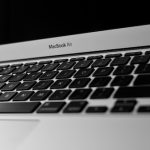
I haven't been this satisfied with a laptop since purchasing a 266MHz PowerBook G3 in February 1999. Apple's smaller MacBook Air is unexpectedly satisfying. By the specs, the little laptop should disappoint. By the experience, it's a delight. I'm simply stunned by how much I enjoy using this notebook -- or should that be netbook?
Design Matters
Is someone fixing ebook prices?
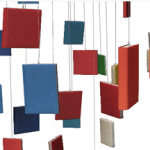
Google's rumored ebookstore is here at last, begging the question: Who has the better price on ebooks? It's certainly the question I'm asking looking ahead to holiday shopping. Ebooks are definitely on my list of gifts this year -- and yours? Early this afternoon, I did a quick comparison, so you won't have to. The results are disturbing. Something stinks like a diaper. It's not the differences in pricing but the uniformity across ebookstores that surprises. Shouldn't competition in a hot new category drive pricing variations?
The first consideration buying ebooks is consumption. On what device? Google's new store appeals for much the same as Amazon's: Broad device support. While Amazon and Google approach the solution in different ways, the result is essentially the same -- ebooks available for reading on Macs, PCs, smartphones and tablets. Uh-oh, there's no native Google ebookstore app for BlackBerry, Kindle or Windows Phone 7. Hey, but Google has got Barnes & Noble Nook and Sony Reader. Eat those bananas, Amazon. Of course, Nook does run Android. I wonder how those B&N folks are feeling about open source -- in this case open competition -- now?
I sold my soul to Google, can I get it back?
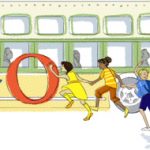
For about six months, I've pondered writing this post asking the dreaded Google question. Following yesterday's announcement that the European Union has opened a Google antitrust investigation, I can wait no longer. My life, and perhaps yours, is enmeshed in Google products and services. If there is a devil, a Great Satan of modern technology companies, Google is it. I sold my soul to Google for free services, which are disrupting -- some would say destroying -- businesses that produce valuable content and other intellectual property. In the 1970s, Microsoft Chairman Bill Gates warned of the very problem Google is creating today: Making things that are inherently valuable nearly worthless.
The problem is simple: Google's business model is fundamentally about free. Someone else pays to produce content or other valuable intellectual property, around which Google wraps search keywords, adverts and services. The information giant doesn't produce content, but its entire business model is about cannibalizing others' valuable intellectual property. Google's search dominance -- anywhere from 65 percent to 90 percent share, depending on the geography and analyst crunching the numbers -- means that content creators must pay homage to free. The content's base value to the producer is at least the cost of production, but content creators are compelled to give away their stuff for less and often for free. If not, the content becomes invisible to the Internet -- or at least to the majority of people who use Google search and other services.
Will Santa stuff your stocking with Windows Phone?
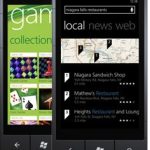
Two days from now, Black Friday officially kicks off the holiday buying season -- although some retailers are off to an early start. I've been wondering; What about Windows Phone? I recall how last holiday sales season, Verizon cranked up Droid sales with two-for-one deals. Yesterday, I got e-mail from AT&T announcing four days of Windows Phone buy one get one free, or what Stephen Baker, NPD's vice president of industry analysis, calls BOGO. Can the offer, presumably others coming later in the holiday season and Microsoft's aggressive Windows Phone 7 advertising campaign jumpstart sales? I refer to jumpstart in context of new software and devices, like Verizon Droids were last year.
BOGOs, whether the one for free or another for half price, are common during the holidays, along with rebates and other discount incentives. AT&T's promotion starts on Friday and applies to all three Windows Phone 7 handsets it carries: HTC Surround, LG Quantum and Samsung Focus. There also is a free accessory offer. Deal takers must agree to a new two-year contract.
I don't believe that 25% of Betanews readers are Linux PC users

Twenty five percent. Well, 25.82 percent to be exact, so closer to 26. That's the number of respondents claiming to be Linux PC users in my poll: "How would you identify yourself as a computer user?" The number is seemingly credible: 2,014 votes from 94 countries -- 988 from the United States. There are 1,858 unique IP addresses, which along with cookies blocking repeat votes suggests the results are largely clean of Linux enthusiasts stuffing the ballot box, so to speak. Something else: After the poll reached the 25 percent Linux PC threshold, it stayed there even as votes accumulated -- that's another indicator the results are good. But I don't believe them, certainly not that only 60 percent of respondents are Windows PC users.
I do believe that Betanews has among its readers very enthusiastic and credible Linux PC users; some of them will share their stories in this post. But the Windows community is much larger, something reflected by other metrics, such as comments or download forums. Additionally, the poll results are unqualified, meaning I don't know who the respondents are. Therefore, I must consider the data to be unreliable.
Microsoft shouldn't break up, but break away from its antiquated business model
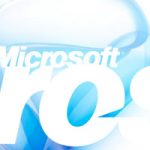
Ten years ago this month, Microsoft settled its antitrust case with the US Justice Department and handful of suing states. The settlement eventually ended government plans to break up Microsoft into two companies. Yesterday, a Microsoft shareholder asked why the company doesn't breakup now. It's a good question. From a shareholder perspective, breakup is probably the best way to return value back to company owners.
Strategically, however, such action would undermine Microsoft plans to reinvent itself for the post-PC era, in part by dragging on the personal computer's relevance long beyond its obsolescence. Breakup's timing would cripple Microsoft competitively, too. But that doesn't mean Microsoft should stick together. There is a case for bringing back internal startups like Live Labs or spinning out one or more companies from the core.
Meet the Beatles on iTunes -- and nowhere else?
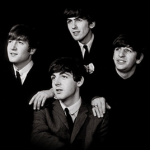
As widely rumored and confirmed ahead of time by the Wall Street Journal, the Beatles debuted on iTunes today in an exclusive distribution deal. I contacted Apple, Apple Corps. and EMI about exclusivity and heard back from Apple early this afternoon. "The Beatles will be exclusively available on iTunes, with exclusivity expiring in 2011," said Apple spokesperson Tom Neumayr. Uh-oh. Exclusivity could bring Apple under fire for violating antitrust laws. The Beatles deal is representative of exclusives available only from iTunes.
Depending on the analyst firm doing the counting, Apple's market share for U.S. digital downloads ranges from more than 70 percent to about 90 percent. Meanwhile, Apple's command of the portable music player market is 75 percent or more, again depending on who's doing the counting. Apple's market-leading position -- not just in the United States -- means that antitrust enforcers apply different rules, so to speak, to Apple compared to its competitors. One thing they'll watch for: Actions that forestall competition or compel consumers to pay higher prices for music.
What if Apple's day 'you'll never forget' is really a day you'll never remember?

Today's Apple homepage iTunes teaser -- "Tomorrow is just another day. That you'll never forget." -- sent the rumormongers howling and Mac fanatics salivating. And I looked on, groaning: "Oh, please, get a life." I really couldn't care less about Apple's so-called "exciting announcement," which distracted from other big tech news, like Facebook's messaging service or Microsoft's 1 million Kinect sales, and from global stories like the coming vote that could divide Sudan into two countries. Apple's little teaser has geek bloggers and reporters once again doing the hamster dance in the proverbial wheel. Steve Jobs has you trained well, and he's promising some sweet kibbel as reward.
I've been chuckling, wondering what would make me never forget. Some days I won't forget: My daughter's birth; my best friend's death; my 14th birthday (I had appendicitis); Sept. 11, 2001; the D.C. Snipers' first day of killing; and Black Friday weekend 2009 car accident. What could Apple do tomorrow that would make it unforgettable? In marketing, smart companies always deliver more than promised. I can't imagine what Apple could deliver tomorrow that would even meet the implications promised.
Do more Betanews readers use Linux PCs than Macs?

It's the unexpected question I'm asking you following Friday's PC user poll, which is embedded below to take additional responses. The poll is about identification, rather than usage. Instead of asking what operating system you run, I ask how you identify yourself as a PC user. Not surprisingly, 76 percent of respondents identify themselves as Windows PC users. But surprisngly -- well, to me -- nearly 12 percent identify themselves as Linux users, which is slightly more than Macintosh. Could this possibly be true?
While the poll is embedded at Betanews, it is accessible by anyone. I expect that most respondents are Betanews readers, but they don't have to be. This post may marshall the fanboys and skew further results, which as I post are 682 votes, with 507 for Windows PC, 77 for Linux PC, 70 for Macintosh and 19 for other. Please vote if you haven't. The poll requires JavaScript. If you have disabled JavaScript or you can't see the embedded poll, please use this link.
'This film is rated PC: No Macs were used in the making of this video'

Yesterday, Microsoft posted video "PC & Mac take flight -- Avatar & Windows 7." It's not the most clever title, but the story is subtle and driving, like good marketing should be. Microsoft mad men once again cleverly market Windows 7 PC benefits, but, more importantly, they quite effectively highlight the differences between a Windows PC and Mac.
The video features a Windows laptop and Mac notebook in adjacent seats on a plane flight. The animated short is long on subtle marketing cues -- like the airplane made out of Campbell soup-like "Windows Seven" cans; plane taking off over a Hollywood-like "Microsoft" sign; Windows logo on fasten-seat-belt-sign; and rating: "This film is rated PC. No Macs were used in the making of this video."
Social networking will displace corporate e-mail

[Editor's Note: The survey below requires JavaScript. If you have disabled JavaScript or can't see the embedded survey, please use this link. You can choose up to two answers.]
In January, I posted "Microsoft Office is obsolete, or soon will be," which generated heated comment debate and accusations of linkbaiting. Never. I'm always serious about this stuff, and I tend to be right. Today, Gartner added a little oomph to my assertion, claiming that within four years, 20 percent of business users will replace e-mail with social networking services. Really? I think Gartner is being a wee bit conservative.
Why did Steve Ballmer sell 12 percent of his stake in Microsoft?
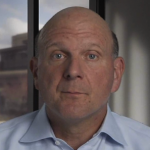
Perhaps he knows something you don't.
I've been asking myself the question all weekend, and now I'd like to pose it to you. I ask Betanews readers to respond to the poll below and to answer in comments; please do both. You can choose up to two answers. I wanted to leave an option for your own reasons, but I worry that trolls would be obnoxious. Sorry. If readers respond favorably, I'll do more polls like this. The poll expires on October 16, 2010 at Midnight PT. Embedded poll below requires JavaScript. If you have disabled JavaScript or otherwise can't see the poll, please go to this link.
Why won't Wall Street give Microsoft a break?
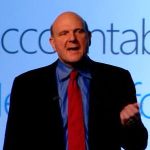
Betanews reader Robert Johnson wants to know the answer to the question, which he asked me on Friday night. His short e-mail "I'm Confused About Microsoft" got me to reflecting again about Microsoft's performance under Steve Ballmer's executive leadership and the stock's moribund consistently sub-$30 over the last 10 years. Microsoft is a hugely profitable company that likely will be for many years, so why won't industry and Wall Street analysts and investors give Microsoft a break?
Before getting to Johnson's e-mail and my response to it, some context: Ballmer ascended to the chief executive's position in January 2000. In October of that year, Microsoft announced fiscal 2001 first quarter income of $2.58 billion from $5.8 billion revenue. An accounting change affected earnings, which were 46 cents a share without it and 40 cents a share with it. By comparison, for fiscal 2010 first quarter, Microsoft reported operating income of $7.12 billion and net income of $5.41 billion, or 62 cents a share, from $16.2 billion revenue. Assuming income in the past means "operating," Microsoft's percentage of income derived from revenue is statistically equivalent for the recent quarter and the one 10 years ago.
Will you connect with Xbox Kinect?
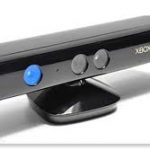
Overnight, Microsoft launched its innovative and somewhat imitative Kinect game controller ("Look, ma, no hands!"). If you stood in line at Midnight -- and, more importantly, if you used Kinect in the wee hours afterwards, please share your story, either in comments or by sending email to joewilcox at gmail dot com. I would prefer email because you can be identified and I can more easily ask followup questions. If you're planning on Kinecting, particularly if you preordered, I ask you to share that story, too. Most importantly is why. Why Kinect?
The game controller's success is hugely important to Microsoft, which needs something more to reinvigorate its consumer brand image. Good start: Successful game titles like Halo Reach, next week's Windows Phone 7 U.S. launch and great TV commercials for Bing, Internet Explorer 8 and Windows 7. Kinect is about generating buzz by generating long lines of Xbox enthusiasts. From marketing and branding perspectives, the games begin outside stores before one controller is sold.
MacBook Air will redefine personal computing
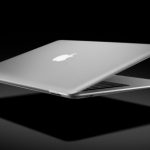
Numbers define us. Last night's U.S. election redefined government by numbers: 51 -- the number of Democratic seats remaining, and they are enough to retain control of the Senate; 239 -- the projected number of Republican House of Representatives seats, which is more than enough for the party to seize control. Birthday, social security, age, bank account and many other numbers define who we are and how we interact with things and people. This week and probably through much of November, I am defined by three numbers: 32, 64, 128 -- and they will likely impact you over the next couple years.
Thirty-two is the GB storage capacity of my iPhone 4; 64GB is storage capacity of my iPad; and 128GB is my new 11.6-inch MacBook Air's storage capacity. I received the Air on Monday and started using it yesterday. These three devices share something more than an Apple logo in common. They represent for Apple, and eventually other computer makers, a shift towards consumer electronics-style design, manufacturing and marketing. The iPad and MacBook Air are industry defining and leading products, by the numbers.
Joe's Bio
Joe Wilcox is BetaNews executive editor. His motto: Change the rules. Joe is a former CNET News staff writer, JupiterResearch senior analyst, and Ziff Davis Enterprise Microsoft Watch editor.
Ethics StatementBetaNews, your source for breaking tech news, reviews, and in-depth reporting since 1998.
© 1998-2025 BetaNews, Inc. All Rights Reserved. About Us - Privacy Policy - Cookie Policy - Sitemap.
